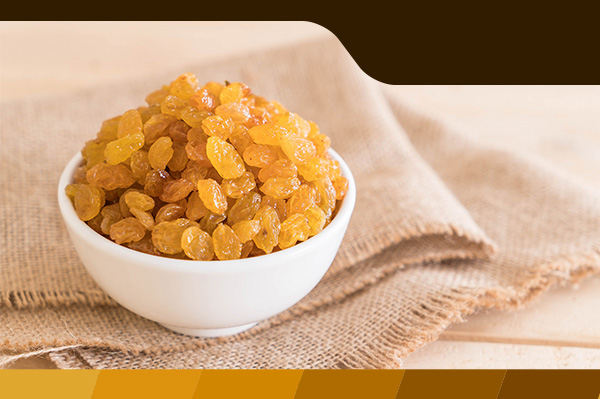Iranain Raisins

Iran is one of the largest producers and exporters of raisins in the world, offering a variety of high-quality raisins. Some popular types of Iranian raisins include:
1. Sultana Raisins: Also known as golden raisins or Thompson seedless raisins, Sultana raisins are light in color, sweet, and seedless. They are widely used in baking, cooking, and as a snack.
2. Kashmari Raisins: These are dark brown to black raisins with a rich and sweet flavor. Kashmari raisins are often used in traditional Iranian dishes and desserts.
3. Malayer Raisins: Malayer is a city in Iran known for producing premium quality raisins. Malayer raisins are dark in color, sweet, and have a chewy texture.
4. Shahani Raisins: Shahani raisins are medium-sized raisins that are dark in color and have a tangy-sweet flavor. They are often used in various Iranian cuisines.
Iranian raisins are popular globally for their sweetness, quality, and versatility in cooking and baking. They are a rich source of energy, fiber, and antioxidants, making them a healthy addition to your diet.
Raisins malekan
Malekan is a city in East Azerbaijan province of Iran, known for its production of high-quality raisins. Malekan raisins are a specific type of raisin that is produced in the region. They are typically made from seedless green grapes and have a dark brown to black color.
Malekan raisins have a sweet and tangy flavor with a chewy texture. They are often used in various Iranian dishes and desserts, such as rice dishes, stews, and baked goods. Malekan raisins are also consumed as a healthy snack, providing natural sugars, fiber, and essential nutrients.
The region’s favorable climate and fertile soil contribute to the production of excellent quality Malekan raisins. They are carefully harvested and dried to preserve their flavor and nutritional value. Malekan raisins are popular both domestically and internationally for their unique taste and quality.
Factory raisin
Raisin production involves several stages, and there are specific facilities, often referred to as raisin processing plants or factories, where the grapes are processed and dried to produce raisins. These facilities are equipped with various machinery and equipment for washing, drying, sorting, and packaging the raisins.
The process typically involves the following steps:
1. Washing: The grapes are thoroughly washed to remove any debris, dirt, or contaminants.
2. De-stemming: The stems are removed from the grapes before the drying process.
3. Drying: The cleaned grapes are laid out on trays or racks and then placed in drying tunnels or exposed to the sun to remove the moisture and dry them into raisins.
4. Sorting: Once dried, the raisins are sorted based on size, color, and quality using specialized equipment.
5. Packaging: The sorted raisins are packaged into bags, boxes, or other containers for distribution and sale.
These raisin processing plants may vary in size and capacity, from small-scale operations to large industrial facilities, depending on the scale of production and the market demand. The facilities adhere to strict hygiene and quality standards to ensure the production of high-quality raisins for both domestic and international markets.
Export raisins
Iran is one of the largest exporters of raisins in the world, with a significant portion of its production being exported to various countries. Iranian raisins are highly regarded for their quality, taste, and variety, making them popular in international markets.
When it comes to exporting raisins from Iran, several key points are worth noting:
1. **Quality Control**: Iranian raisin exporters often ensure strict quality control measures throughout the production process to meet international standards and regulations. This includes proper cleaning, sorting, and packaging of the raisins.
2. **Varieties**: Iran offers a wide range of raisin varieties, such as Sultana (golden) raisins, Kashmari raisins, Malayer raisins, and Shahani raisins. Exporters can cater to different market preferences by providing various types of raisins.
3. **Packaging**: Proper packaging is crucial for exporting raisins to maintain their quality during transit. Exporters often use vacuum-sealed bags, cartons, or other suitable containers to preserve the raisins and prevent spoilage.
4. **Market Access**: Iranian raisin exporters need to comply with import regulations and standards of the destination countries. This may include meeting specific labeling requirements, certifications, and food safety standards.
5. **Logistics**: Exporters need to consider efficient logistics arrangements for shipping raisins to international markets. This involves choosing appropriate transportation modes, managing storage and warehousing, and ensuring timely delivery.
Overall, Iranian raisin exporters play a significant role in supplying high-quality raisins to consumers around the world, contributing to the country’s economy and showcasing the diversity and excellence of Iranian agricultural products on the global stage.

